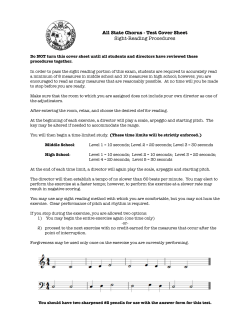
3G Synthetic Pitch Report
Report Wigtown Area Committee 1 April 2015 3G SYNTHETIC PITCH, BLAIRMOUNT, NEWTON STEWART 1. Purpose of Report As noted by this Committee on 14 January 2015, this report provides Members with an explanation of why flooding occurred at the Newton Stewart Synthetic Grass Pitch now that investigations have been completed. 2. Recommendations Members are asked to note:2.1 the background to the current problems at the Newton Stewart 3G pitch as requested by Members at this Committee on 14 January 2015; 2.2 the remedial actions planned to be undertaken during the next available weather window; and 2.3 the monitoring arrangements in place to ensure resolution of the problem. 3. Considerations 3.1 Background 3.1.1 The 3G synthetic pitch at Blairmount, Newton Stewart was complete on 17 October 2013 and handed over to Newton Stewart Football Club. The pitch is certified to FIFA 1* standard and is also IRB 22 compliant (the International Rugby Board’s Regulation 22 Standard relating to the use of artificial rugby turf). Compliance with these two standards enables both football and rugby to be played on the surface. 3.1.2 The pitch is made up of 300mm of stone sub base, 45mm porous tarmac, a 15mm porous rubber shock pad, a 60mm synthetic carpet with approximately 15mm sand and 30mm of granular rubber infill. The whole system drains via a drainage system to a soakaway to the west of the clubhouse. 3.1.3 The pitch was maintained for the first 12 months throughout the Rectification Period (or Defect Liability Period) by Souter’s Maintenance Services, a maintenance contractor working on behalf of the main contractor, W H Malcolm Ltd. 3.1.4 Newton Stewart FC reported standing water on the surface on one occasion during the first month of operation but there was no reoccurrence of this during the whole of the 2013/14 winter or the summer of 2014 and the pitch performed well during this time. 3.1.5 As part of the contract specification, the main contractor was required to carry out a decompaction of the rubber granules to ensure free drainage and maintain support to the grass sward. 3.1.6 The final maintenance visit was carried out in October 2014 and the playing surface decompacted with metal tines being passed through the rubber infill. 3.1.7 On 10 November 2014, Newton Stewart FC advised that a game had been cancelled the previous weekend as the pitch was waterlogged. Report Wigtown Area Committee 1 April 2015 3.2 Actions 3.2.1 Various visits and actions were undertaken in the next few weeks following this cancellation, and the timeline and works involved are provided in detail on the Appendix to this report. 3.2.2 The specialist sports field construction consultant engaged to advise on the project visited site and arranged independent testing of the construction and the materials used. This visit took place on 6 January 2015. 3.2.3 Prior to the tests being undertaken, a period of hard frost was experienced between Christmas and New Year in December 2014. Following this frost, the surface returned to free draining and on visits to site by Property and Architectural Services (PAS) on 7 and 12 January 2015, following heavy rain, the surface showed no signs of standing water. 3.2.4 The independent test report of the sample removed from site was received in late February and showed the surface to have infiltration rates of 585-960mm/hr for the surface and >2000mm/hr for the shockpad and tarmac. These compare favourably with the required specification values of 180mm/hr. 3.2.5 The report suggests several potential reasons why the surface was flooding: Sand size grading at the lower end of the specified range Fewer holes in the back of the synthetic carpet Water tension Infill coagulation caused by an external source or material defect. 3.2.6 None of these factors had been proven during testing to be the primary cause of the flooding. The surface has performed satisfactorily over the initial 12 months and therefore the first two points noted at 3.2.5 can reasonably be eliminated. 3.2.7 Testing confirmed that the infill was draining, albeit at a slower rate than anticipated, and was not unduly compact or coagulated. No external contamination or material defects were identified during the testing. 3.2.8 The general conclusion is that the flooding is being caused by a phenomenon known as a “perched water table”. This appears to happen when electrostatic forces create surface tension in the rubber infill and prevent the water passing between the rubber granules. 3.2.9 It was generally accepted by the design and construction team that the effect of the frost during the Christmas / New Year Period has broken down this tension and eliminated the electrostatic forces thereby solving the problem. 3.3 Situation at the date of preparing the Committee Report 3.3.1 On 23 February 2015 a further call was received by PAS that the ground had again flooded. Various visits were made to the site and further advice sought from the specialist sports field construction consultant as well as the main contractor. Report Wigtown Area Committee 1 April 2015 3.3.2 After checking the long-range weather forecast, a site visit was arranged for 12 March 2015 as it was forecast with heavy rain. This visit took place with officers from Leisure and Sport and PAS, together representatives from the specialist sports field construction consultant, the main contractor, the maintenance contractor, the carpet manufacturer and Newton Stewart FC. 3.3.4 The heavy rain forecast was present and the flooding of the playing surface was evident with 20-30mm of standing water on the surface by mid-afternoon. 3.3.5 The surface make-up and the characteristics of the shock pad and tarmac were examined under wet conditions and the operation of the drainage system was observed. It was clear from examination of all components that the problem lay in the carpet infill and the rate at which water was percolating through this. 3.4 Proposed Remedial Action 3.4.1 After discussion, the following course of action has been agreed: 1. A quantity of free surface water is draining from the surrounding roadway and upper playing field. The drainage system will be extended to intercept this and pipe this away from the playing surface. This will result in an additional cost to the project of £11,953 as the work is outside the original contract scope. This extra cost will be funded from the Land Asset Class in the capital investment programme 2014/2015. 2. A test hole will be dug in the block paving area to confirm the sub base below the playing surface is free draining and not holding water causing backing up to the surface. 3. The soakaway will be fitted with a positive piped overflow arrangement to ensure no possibility of filling and backing up. 4. The playing surface will be decompacted and treated with a wetting agent to breakdown the surface tension thus restoring the free draining properties of the surface; several treatments may be required. 3.4.2 PAS will monitor the pitch during periods of rain to assess the effectiveness of the remedial works. The findings of the monitoring will be reviewed and further works will be arranged if necessary. 4 Governance Assurance The Director Community and Customer Services, Head of Resource & Planning Community & Customer Services and Service Manager, Change Programming Community Facilities have been consulted and are in agreement with the information contained in this report. 5 Impact Assessment The report does not impose a change in policy, the formal adoption of a plan, policy or strategy it is not necessary to complete an Impact Assessment. Report Wigtown Area Committee 1 April 2015 Author(s) NAME DESIGNATION CONTACT DETAILS John Kerr Principal Architect John.kerr@dumgal.gov.uk Louise Matheson Senior Manager Property and Architectural Services Louise.matheson@dumgal.gov.uk Approved by NAME DESIGNATION Lorna Meahan Assistant Chief Executive Appendices –1 Appendix - Timeline Background Papers Minute of the Wigtown Area Committee 14 January 2015, item 7.4 http://egenda.dumgal.gov.uk/aksdumgal/users/public/admin/kab12.pl?cmte=WIG&meet=3 2&arc=71
© Copyright 2025









